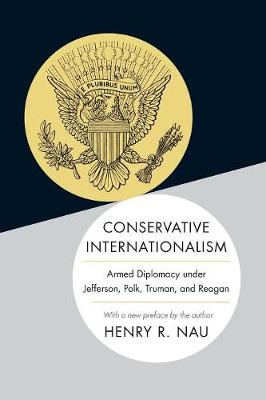
Stock image for illustration purposes only - book cover, edition or condition may vary.
Conservative Internationalism: Armed Diplomacy under Jefferson, Polk, Truman, and Reagan
Henry R. Nau
€ 47.29
FREE Delivery in Ireland
Description for Conservative Internationalism: Armed Diplomacy under Jefferson, Polk, Truman, and Reagan
Paperback. Num Pages: 352 pages, 1 halftone. 3 line illus. 1 table. 2 maps. BIC Classification: HBJK; JPA; JPSD. Category: (P) Professional & Vocational; (U) Tertiary Education (US: College). Dimension: 159 x 235 x 27. Weight in Grams: 508.
Debates about U.S. foreign policy have revolved around three main traditions--liberal internationalism, realism, and nationalism. In this book, distinguished political scientist Henry Nau delves deeply into a fourth, overlooked foreign policy tradition that he calls conservative internationalism. This approach spreads freedom, like liberal internationalism; arms diplomacy, like realism; and preserves national sovereignty, like nationalism. It targets a world of limited government or independent sister republics, not a world of great power concerts or centralized international institutions. Nau explores conservative internationalism in the foreign policies of Thomas Jefferson, James Polk, Harry Truman, and Ronald Reagan. These presidents did more than any others to expand the arc of freedom using a deft combination of force, diplomacy, and compromise. Since Reagan, presidents have swung back and forth among the main traditions, overreaching under Bush and now retrenching under Obama. Nau demonstrates that conservative internationalism offers an alternative way. It pursues freedom but not everywhere, prioritizing situations that border on existing free countries--Turkey, for example, rather than Iraq. It uses lesser force early to influence negotiations rather than greater force later after negotiations fail. And it reaches timely compromises to cash in military leverage and sustain public support. A groundbreaking revival of a neglected foreign policy tradition, Conservative Internationalism shows how the United States can effectively sustain global leadership while respecting the constraints of public will and material resources.
Product Details
Publisher
Princeton University Press
Format
Paperback
Publication date
2015
Condition
New
Weight
508g
Number of Pages
352
Place of Publication
New Jersey, United States
ISBN
9780691168494
SKU
V9780691168494
Shipping Time
Usually ships in 7 to 11 working days
Ref
99-1
About Henry R. Nau
Henry R. Nau is professor of political science and international affairs in the Elliott School of International Affairs at George Washington University.
Reviews for Conservative Internationalism: Armed Diplomacy under Jefferson, Polk, Truman, and Reagan
In the wake of Syria-related brinkmanship, it is easy to see, at the moment, how enduringly important it is to manage force in human affairs... [Nau] identifies six traditions in American diplomatic history and connects each to at least one important president whose policies capture the tradition's outlook ... the general reader can learn a good deal.
Wall Street Journal Nau is interesting, provocative, and sometimes convincing when he looks for signs of conservative internationalism through the long sweep of U.S. history. His description of that school of thought alone makes this book worth reading... This is a valuable way of thinking about U.S. foreign policy for a post-Bush, post-Obama future.
Foreign Affairs Conservative Internationalism offers a rigorous and thought provoking conceptual look into an important dimension of U.S. foreign policy. It raises in particular the question of whether the literature on American liberal internationalism focuses too much on the 'liberal' and not enough on the 'internationalism.' If so, Nau tilts back the balance here.
Nicolas Bouchet, International Affairs Throughout this tightly reasoned book, Nau carefully defines relevant terms, identifies the key features and principles of conservative internationalism, and distinguishes it from nationalism, realism, and liberal internationalism... This book would be a solid addition to courses on foreign policy or American politics.
Choice An important book for 2014, it sets out a manifesto for a classical liberal but non-isolationist approach to foreign policy.
Tyler Cowen, Marginal Revolution [Nau] has presented a useful reference work for researchers attempting to determine what inspires U.S. presidents to go to war and what dissuades them.
Wes Vernon, Washington Times
Wall Street Journal Nau is interesting, provocative, and sometimes convincing when he looks for signs of conservative internationalism through the long sweep of U.S. history. His description of that school of thought alone makes this book worth reading... This is a valuable way of thinking about U.S. foreign policy for a post-Bush, post-Obama future.
Foreign Affairs Conservative Internationalism offers a rigorous and thought provoking conceptual look into an important dimension of U.S. foreign policy. It raises in particular the question of whether the literature on American liberal internationalism focuses too much on the 'liberal' and not enough on the 'internationalism.' If so, Nau tilts back the balance here.
Nicolas Bouchet, International Affairs Throughout this tightly reasoned book, Nau carefully defines relevant terms, identifies the key features and principles of conservative internationalism, and distinguishes it from nationalism, realism, and liberal internationalism... This book would be a solid addition to courses on foreign policy or American politics.
Choice An important book for 2014, it sets out a manifesto for a classical liberal but non-isolationist approach to foreign policy.
Tyler Cowen, Marginal Revolution [Nau] has presented a useful reference work for researchers attempting to determine what inspires U.S. presidents to go to war and what dissuades them.
Wes Vernon, Washington Times
